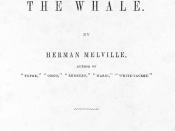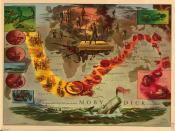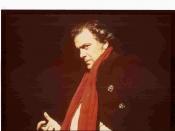Moby Dick is a story of Captain Ahab, commander of the whaling ship Pequod, who seeks revenge upon the white whale that took his leg. Ahab struggles with the whale Moby Dick, but also against what the whale symbolizes: the awesome power of nature. As evinced by dialogue in the later chapters, the captain comes to realize that Fate, or some larger universal power, controls him. Despite his apparent recognition of the futility and evil of his quest, Ahab forsakes family (young wife and son), friends (Starbuck), and crew in pursuing the object of his blind hatred. The narrator Ishmael actively participates in this conflict, noting upon numerous occasions omens of doom such as the appearance of the squid and the misalignment of the compass during a severe storm. He understands that the captain's motivations are corrupt, and states this to the reader often. In the end, Ahab's futile struggle against Nature is resolved in his and his ship's destruction.
By destroying Ahab, Melville sends the message that Nature and Fate are unconquerable, that man must realize this truth and accept it. On a minor level, Ishmael finds conflict within himself; his entire motivation for shipping aboard the Pequod is to gain worldly knowledge, both of the sea and of his fellow man. His close friendship with Queequeg is evidence of his struggle to accept foreign cultures and ideas. However, in the end, Ishmael finds himself exactly where he started, alone on the open sea, just "another orphan".
I believe the high point of the novel was when Captain Ahab, after watching Moby Dick destroy the Pequod, struck a final time with his harpoon at the white whale. By doing this, Ahab showed that while he understood his desire for revenge was unjust, he still was unable to...


